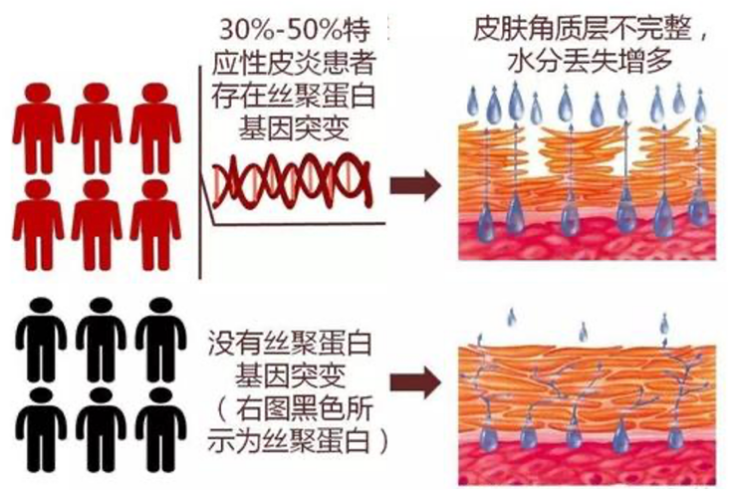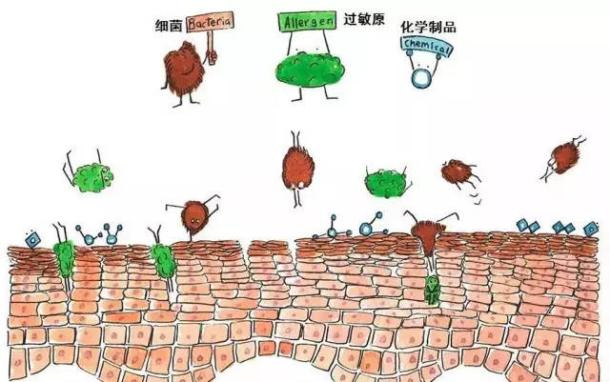What is the cause of atopic dermatitis that is so itchy?
Itching may be the biggest skin problem that elderly friends encounter, the weather turns cold, the dead of night, itching to find the door, must scratch a few or even grasp the bleeding marks to enjoy, this repeated itching, rash may not only people often say eczema, but also may be another disease - atopic dermatitis. This disease is increasingly occurring in the elderly as society ages.
Atopic dermatitis patients often suffer from itching, always want to break with it, and the premise of breaking with it is first to find out the cause of atopic dermatitis, to understand its pathogenesis. Unfortunately, the cause of atopic dermatitis has not been fully understood so far, and there are still many scientists in the world who are searching for the cause. Based on thousands of research results around the world, we make a summary of the etiology of atopic dermatitis classified into three parts: genes, environment and immunity. Sounds like a tall order, but don't worry, here we explain in detail how these three factors are related to atopic dermatitis.
Let's start with suspect number one -- genes, what we often call heredity, evidence suggests that genes are one of the main culprits in atopic dermatitis. Research surveys have found that most atopic dermatitis patients and their close relatives may also suffer from asthma, allergic rhinitis, food allergies and other diseases, which have some common characteristics, collectively referred to as atopic diseases. In addition, genes for proteins involved in human skin barrier and immune function are often mutated in patients with atopic dermatitis. For example, a very important component of the human epidermal barrier - filaggrin, filaggrin is important for maintaining skin integrity and function, lack of filaggrin will cause skin moisture loss and increase. The relevant genes of filaginin are mutated in about one-third of atopic dermatitis patients, and people with these mutations not only have a higher chance of developing atopic dermatitis, but also tend to have various symptoms of atopic dermatitis in infants and children, such as itching, food allergies, and skin redness.
 Let's move on to suspect number two. - Environmental factors. The environment we live in is complex and diverse. The good environmental factors are conducive to our physical and mental health, while the bad environmental factors will affect the health of the human body and lead to diseases. Many common chronic diseases such as hypertension, diabetes, and coronary heart disease have been shown to be closely related to environmental factors, and the same is true of atopic dermatitis.
Let's move on to suspect number two. - Environmental factors. The environment we live in is complex and diverse. The good environmental factors are conducive to our physical and mental health, while the bad environmental factors will affect the health of the human body and lead to diseases. Many common chronic diseases such as hypertension, diabetes, and coronary heart disease have been shown to be closely related to environmental factors, and the same is true of atopic dermatitis.
When we are healthy, the barrier function of the skin is like a wall, separating the body from harmful substances in the outside world. The walls were strong, but sometimes they were breached. Dryness, cold air, air pollution, and detergents can cause increased skin moisture loss, reduced substances that maintain skin barrier function, and even directly cause skin damage. This weakens the skin's ability to resist various pathogens and other harmful substances in the outside world. At this time, the environment is full of various harmful pathogens, such as staphylococcus aureus, viruses, etc., will take advantage of the opportunity to enter.
 When the first line of defense is defeated, the body has a powerful second line of defense - the immune system, which is our third suspect. The immune system contains a variety of immune cells, which act like patrols, and when they detect the invasion of harmful substances, they will launch an onslaught against these harmful substances, thereby limiting the spread of harmful substances in the body. On the one hand, these immune responses will quickly remove these harmful substances, but on the other hand, these immune responses are also a double-edged sword, in the process of clearing these substances will have a large number of substances that cause skin inflammation. Over time, the originally stable and reliable immune system has become overwhelmed, not only can not effectively protect us, but also may increase our probability of developing atopic dermatitis. For example, in some cases, the body's immune system is dysfunctional, the immune system is resistant to harmful substances, but also to substances that usually do not pose a threat to the human body, so that allergic reactions occur, these substances that cause allergic reactions are called allergens, such as dust mites, animal hair, food, metals, chemical fibers and so on. In the process of allergic reaction, the body will have a large number of inflammatory substances released, which can cause skin damage.
When the first line of defense is defeated, the body has a powerful second line of defense - the immune system, which is our third suspect. The immune system contains a variety of immune cells, which act like patrols, and when they detect the invasion of harmful substances, they will launch an onslaught against these harmful substances, thereby limiting the spread of harmful substances in the body. On the one hand, these immune responses will quickly remove these harmful substances, but on the other hand, these immune responses are also a double-edged sword, in the process of clearing these substances will have a large number of substances that cause skin inflammation. Over time, the originally stable and reliable immune system has become overwhelmed, not only can not effectively protect us, but also may increase our probability of developing atopic dermatitis. For example, in some cases, the body's immune system is dysfunctional, the immune system is resistant to harmful substances, but also to substances that usually do not pose a threat to the human body, so that allergic reactions occur, these substances that cause allergic reactions are called allergens, such as dust mites, animal hair, food, metals, chemical fibers and so on. In the process of allergic reaction, the body will have a large number of inflammatory substances released, which can cause skin damage.
Although these three factors sound abstract and complex, do you feel that they are closely related to your daily life after reading the analysis? Finally, I hope that the continuous progress of science can help us finally defeat atopic dermatitis, so that patients suffering from allergies and itching have healthy skin again!
Author:
Department of Dermatology, Union Hospital, Tongji Medical College, Huazhong University of Science and Technology
Song Zexing and Qian Yue
(The opinions expressed are solely those of the author. Some pictures in this article are from the Internet, if there is infringement, please contact to delete)

